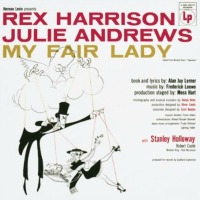 Original Broadway Cast, 1956 (Columbia/Sony)
Original Broadway Cast, 1956 (Columbia/Sony)  (5 / 5) My Fair Lady is still regarded by many as the supreme achievement of the American musical theater, and the original performances of Rex Harrison as Henry Higgins, Julie Andrews as Eliza Doolittle, Stanley Holloway as Alfred P. Doolittle, and Robert Coote as Colonel Pickering are considered definitive. Overall, lyricist-librettist Alan Jay Lerner and composer Frederick Loewe did such a masterful job in adapting George Bernard Shaw’s Pygmalion to the musical stage that critics have been happy to forgive the several grammatical errors in Lerner’s lyrics, as well as his use of some words and expressions that are not employed in British English. The show was the biggest hit of its era, and you can hear the excitement of everyone involved on the cast album, recorded in the flush of great success. Harrison has the time of his life as Higgins; his obvious enjoyment of the role makes an overbearing character tremendously entertaining. The young Andrews is a dream Eliza, equally effective as the squawking guttersnipe and the grand lady with pear-shaped tones. Her best moments on the album are “I Could Have Danced All Night” and “Show Me,” but she’s loverly throughout. Holloway, in the role of Eliza’s father, is a charming rogue as he leads the ensemble in “With a Little Bit of Luck” and “Get Me to the Church on Time.” Coote is wonderfully droll as Pickering, and the rich-voiced John Michael King does a fine job with Freddy Eynsford-Hill’s “On the Street Where You Live.” Franz Allers conducts the score with great skill and energy. (The fabulous orchestrations are by Robert Russell Bennett and Philip J. Lang.) As performed and recorded here, “The Rain in Spain” is an electrifying moment of joyful triumph, and if the first few measures of the brilliant overture don’t start your pulse racing, you’ve probably already shuffled off this mortal coil. Whatever its minor flaws, this recording is stunningly well done, and should be a cornerstone of every cast album collection. — Michael Portantiere
(5 / 5) My Fair Lady is still regarded by many as the supreme achievement of the American musical theater, and the original performances of Rex Harrison as Henry Higgins, Julie Andrews as Eliza Doolittle, Stanley Holloway as Alfred P. Doolittle, and Robert Coote as Colonel Pickering are considered definitive. Overall, lyricist-librettist Alan Jay Lerner and composer Frederick Loewe did such a masterful job in adapting George Bernard Shaw’s Pygmalion to the musical stage that critics have been happy to forgive the several grammatical errors in Lerner’s lyrics, as well as his use of some words and expressions that are not employed in British English. The show was the biggest hit of its era, and you can hear the excitement of everyone involved on the cast album, recorded in the flush of great success. Harrison has the time of his life as Higgins; his obvious enjoyment of the role makes an overbearing character tremendously entertaining. The young Andrews is a dream Eliza, equally effective as the squawking guttersnipe and the grand lady with pear-shaped tones. Her best moments on the album are “I Could Have Danced All Night” and “Show Me,” but she’s loverly throughout. Holloway, in the role of Eliza’s father, is a charming rogue as he leads the ensemble in “With a Little Bit of Luck” and “Get Me to the Church on Time.” Coote is wonderfully droll as Pickering, and the rich-voiced John Michael King does a fine job with Freddy Eynsford-Hill’s “On the Street Where You Live.” Franz Allers conducts the score with great skill and energy. (The fabulous orchestrations are by Robert Russell Bennett and Philip J. Lang.) As performed and recorded here, “The Rain in Spain” is an electrifying moment of joyful triumph, and if the first few measures of the brilliant overture don’t start your pulse racing, you’ve probably already shuffled off this mortal coil. Whatever its minor flaws, this recording is stunningly well done, and should be a cornerstone of every cast album collection. — Michael Portantiere
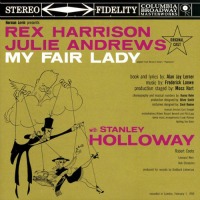 Original London Cast, 1959 (Columbia/Sony)
Original London Cast, 1959 (Columbia/Sony)  (2 / 5) The peerless original Broadway cast album of My Fair Lady was recorded just a few months before stereo was established as the industry norm. Since the four leads of the Broadway production repeated their roles in London, the powers that were at Columbia Records decided that a new cast album in true stereo would be highly marketable. Alas, the London recording turned out to be a disappointment. As Higgins, Rex Harrison here indulges in quite a bit of overacting. Julie Andrews, who was reportedly ill for the recording sessions, sounds rather tired and droopy — although, on the plus side, her delivery of Eliza’s Cockney accent here is more natural than on the prior album, which helps make for a more satisfying performance of “Wouldn’t it Be Loverly?” in particular. This time out, both Andrews and Stanley Holloway do an awful lot of talk-singing, giving Harrison a run for his money in that respect. Robert Coote rushes “You Did It,” which is surprising, since conductor Cyril Ornadel’s conducting of this and some of the other songs is very brisk to begin with (and quite sloppy in a few sections). In Freddy’s “On the Street Where You Live,” Leonard Weir sounds a little thin and under-powered in his lower register, even though the key of the song has been raised, but his voice blooms on the high notes, and his accent is more authentically British than his Broadway predecessor. (The latter can also be said of the members of the singing ensemble, which of course is not surprising under the circumstances.) Ironically, the sound quality of this recording is inferior to that of the original; yes, the London album is stereophonic, but there’s significant distortion in certain tracks, most severely in the overture, and the general timbre of the sound lacks the warmth of the monophonic original. A fascinating anomaly of the album is that it reflects some rewrites done by Lerner because he only belatedly realized (or was informed) that several words, phrases, and expressions he had used in his lyrics are not employed in British English. So, for example, in “Get Me to The Church on Time,” the phrase “stamp me and mail me” was changed to “bond me and bail me” (as the Brits say “post” rather than “mail”), and in “Show Me,” Eliza here sings “Please don’t implore, beg or beseech, don’t make a speech” rather than “Don’t talk of June, don’t talk of fall, don’t talk at all” (as the Brits say “autumn,” never “fall.”) Note: The CD/digital issue of this album includes as a bonus track Percy Faith’s recording of the beautiful “Embassy Waltz,” which had not been recorded for either the original Broadway or the London cast album. — M.P.
(2 / 5) The peerless original Broadway cast album of My Fair Lady was recorded just a few months before stereo was established as the industry norm. Since the four leads of the Broadway production repeated their roles in London, the powers that were at Columbia Records decided that a new cast album in true stereo would be highly marketable. Alas, the London recording turned out to be a disappointment. As Higgins, Rex Harrison here indulges in quite a bit of overacting. Julie Andrews, who was reportedly ill for the recording sessions, sounds rather tired and droopy — although, on the plus side, her delivery of Eliza’s Cockney accent here is more natural than on the prior album, which helps make for a more satisfying performance of “Wouldn’t it Be Loverly?” in particular. This time out, both Andrews and Stanley Holloway do an awful lot of talk-singing, giving Harrison a run for his money in that respect. Robert Coote rushes “You Did It,” which is surprising, since conductor Cyril Ornadel’s conducting of this and some of the other songs is very brisk to begin with (and quite sloppy in a few sections). In Freddy’s “On the Street Where You Live,” Leonard Weir sounds a little thin and under-powered in his lower register, even though the key of the song has been raised, but his voice blooms on the high notes, and his accent is more authentically British than his Broadway predecessor. (The latter can also be said of the members of the singing ensemble, which of course is not surprising under the circumstances.) Ironically, the sound quality of this recording is inferior to that of the original; yes, the London album is stereophonic, but there’s significant distortion in certain tracks, most severely in the overture, and the general timbre of the sound lacks the warmth of the monophonic original. A fascinating anomaly of the album is that it reflects some rewrites done by Lerner because he only belatedly realized (or was informed) that several words, phrases, and expressions he had used in his lyrics are not employed in British English. So, for example, in “Get Me to The Church on Time,” the phrase “stamp me and mail me” was changed to “bond me and bail me” (as the Brits say “post” rather than “mail”), and in “Show Me,” Eliza here sings “Please don’t implore, beg or beseech, don’t make a speech” rather than “Don’t talk of June, don’t talk of fall, don’t talk at all” (as the Brits say “autumn,” never “fall.”) Note: The CD/digital issue of this album includes as a bonus track Percy Faith’s recording of the beautiful “Embassy Waltz,” which had not been recorded for either the original Broadway or the London cast album. — M.P.
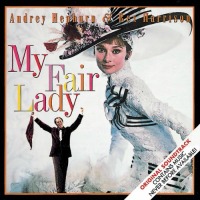 Film Soundtrack, 1964 (Columbia/Sony)
Film Soundtrack, 1964 (Columbia/Sony)  (3 / 5) This recording boasts fabulous orchestrations by Alexander Courage, Robert Franklyn, and Al Woodbury, created under the supervision of conductor André Previn. The orchestrations are lush without ever seeming gimmicky or overblown. Rex Harrison’s Henry Higgins actually sounds fresher here than on the London cast recording; it would seem that a break from the role benefited his performance. As for Eliza Doolittle, the initial plan was to try to use Audrey Hepburn’s singing voice as much as possible, so she recorded several of the songs transposed to the keys in which she was most comfortable. But even after it was decided that “Ghostess with the Mostes'” Marni Nixon would dub almost all of Hepburn’s singing (except for the first and last sections of “Just You Wait” and two lines at the beginning of “I Could Have Danced All Night”), the Hepburn keys were retained. As a result, Nixon’s performance was compromised, and Eliza’s songs come across only moderately well on this recording. But Stanley Holloway, back again as Alfie Doolittle, is perfect as ever; Wilfrid Hyde-White is an ingratiating Pickering; and vocal ghost Bill Shirley persuasively sings “On the Street Where You Live” on behalf of actor Jeremy Brett’s Freddy, even if their voices seem quite a poor match when you hear the switch from dialogue to song while watching the film. The CD is a much-expanded version of the original LP. Extras include a lovely orchestral version of “Wouldn’t It Be Loverly?” for the flower market scene preceding “With a Little Bit of Luck,” the servants’ chorus lead-in to “The Rain in Spain,” the intermission and exit music, and best of all, the gorgeous “Embassy Waltz.” Interestingly, all of the song lyrics as heard in the film are the original versions, complete with the inauthentic American rather than British phrasing noted in the review of the London cast album above. — M.P.
(3 / 5) This recording boasts fabulous orchestrations by Alexander Courage, Robert Franklyn, and Al Woodbury, created under the supervision of conductor André Previn. The orchestrations are lush without ever seeming gimmicky or overblown. Rex Harrison’s Henry Higgins actually sounds fresher here than on the London cast recording; it would seem that a break from the role benefited his performance. As for Eliza Doolittle, the initial plan was to try to use Audrey Hepburn’s singing voice as much as possible, so she recorded several of the songs transposed to the keys in which she was most comfortable. But even after it was decided that “Ghostess with the Mostes'” Marni Nixon would dub almost all of Hepburn’s singing (except for the first and last sections of “Just You Wait” and two lines at the beginning of “I Could Have Danced All Night”), the Hepburn keys were retained. As a result, Nixon’s performance was compromised, and Eliza’s songs come across only moderately well on this recording. But Stanley Holloway, back again as Alfie Doolittle, is perfect as ever; Wilfrid Hyde-White is an ingratiating Pickering; and vocal ghost Bill Shirley persuasively sings “On the Street Where You Live” on behalf of actor Jeremy Brett’s Freddy, even if their voices seem quite a poor match when you hear the switch from dialogue to song while watching the film. The CD is a much-expanded version of the original LP. Extras include a lovely orchestral version of “Wouldn’t It Be Loverly?” for the flower market scene preceding “With a Little Bit of Luck,” the servants’ chorus lead-in to “The Rain in Spain,” the intermission and exit music, and best of all, the gorgeous “Embassy Waltz.” Interestingly, all of the song lyrics as heard in the film are the original versions, complete with the inauthentic American rather than British phrasing noted in the review of the London cast album above. — M.P.
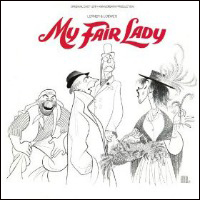 Broadway Cast, 1976 (Columbia/Masterworks Broadway)
Broadway Cast, 1976 (Columbia/Masterworks Broadway) (4.5 / 5) The CD edition of this cast album of the 20th anniversary Broadway revival of My Fair Lady was issued belatedly but was very welcome when it did appear, as the recording is excellent overall. Ian Richardson is a witty and mercurial Higgins, though some listeners may feel he does a bit too much shouting. Christine Andreas is a superb, golden-voiced Eliza, singing some of the character’s songs in higher keys than Julie Andrews did for the OBCR, with perfect cockney and then RP accents. George Rose has a marvelous, rousing time as Alfie P. Doolittle; he won a Tony Award for his performance, in the Best Actor rather than Featured Actor category. It’s great to have the wonderfully funny and authentic Robert Coote back as Colonel Pickering. And Jerry Lanning is the most vocally resplendent Freddy on record, so much so that when he sings “On the Street Where You Live,” you almost expect Eliza to throw herself right into his arms. The sound quality of the recording is somewhat dry, but sharp and clear. And it sure is a lovely bonus that the album cover features a new sketch by the legendary Al Hirschfeld, a treasurable companion piece to his iconic work for the original production. — M.P.
(4.5 / 5) The CD edition of this cast album of the 20th anniversary Broadway revival of My Fair Lady was issued belatedly but was very welcome when it did appear, as the recording is excellent overall. Ian Richardson is a witty and mercurial Higgins, though some listeners may feel he does a bit too much shouting. Christine Andreas is a superb, golden-voiced Eliza, singing some of the character’s songs in higher keys than Julie Andrews did for the OBCR, with perfect cockney and then RP accents. George Rose has a marvelous, rousing time as Alfie P. Doolittle; he won a Tony Award for his performance, in the Best Actor rather than Featured Actor category. It’s great to have the wonderfully funny and authentic Robert Coote back as Colonel Pickering. And Jerry Lanning is the most vocally resplendent Freddy on record, so much so that when he sings “On the Street Where You Live,” you almost expect Eliza to throw herself right into his arms. The sound quality of the recording is somewhat dry, but sharp and clear. And it sure is a lovely bonus that the album cover features a new sketch by the legendary Al Hirschfeld, a treasurable companion piece to his iconic work for the original production. — M.P.
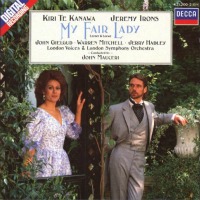 Studio Cast, 1987 (London)
Studio Cast, 1987 (London)  (3 / 5) As Eliza Doolittle, the Maori operatic soprano Kiri Te Kanawa affects a convincing Cockney accent, and her voice blooms in the higher reaches of the score. Still, there’s a studied quality to her performance, and she sounds a bit too mature for the role — more grande dame than young girl, especially after Eliza’s transformation into a lady with perfect speech. Also, the keys of some of Eliza’s songs have been raised for Te Kanawa, and this is sometimes counterproductive, as in “Show Me.” Jeremy Irons is quite fine as Higgins, although he perhaps overdoes the petulance and anger of the character, and he sings rather than speaks more of Higgins’ songs than is desirable. Conversely, Sir John Gielgud talks his way nearly throughout “You Did It,” and he sounds ancient. On the plus side, opera tenor Jerry Hadley’s voice is well suited for “On the Street Where You Live,” and Warren Mitchell is a colorful Alfie Doolittle. The Brit dialect accents called for in the various choral numbers, whether RP in “The Ascot Gavotte” or Cockney in “With a Little Bit of Luck” and “Get Me to the Church on Time,” are accurately rendered by The London Voices. The London Symphony Orchestra is ably led by John Mauceri, and more of the brilliant My Fair Lady score is included here than in any previous recording. — M.P.
(3 / 5) As Eliza Doolittle, the Maori operatic soprano Kiri Te Kanawa affects a convincing Cockney accent, and her voice blooms in the higher reaches of the score. Still, there’s a studied quality to her performance, and she sounds a bit too mature for the role — more grande dame than young girl, especially after Eliza’s transformation into a lady with perfect speech. Also, the keys of some of Eliza’s songs have been raised for Te Kanawa, and this is sometimes counterproductive, as in “Show Me.” Jeremy Irons is quite fine as Higgins, although he perhaps overdoes the petulance and anger of the character, and he sings rather than speaks more of Higgins’ songs than is desirable. Conversely, Sir John Gielgud talks his way nearly throughout “You Did It,” and he sounds ancient. On the plus side, opera tenor Jerry Hadley’s voice is well suited for “On the Street Where You Live,” and Warren Mitchell is a colorful Alfie Doolittle. The Brit dialect accents called for in the various choral numbers, whether RP in “The Ascot Gavotte” or Cockney in “With a Little Bit of Luck” and “Get Me to the Church on Time,” are accurately rendered by The London Voices. The London Symphony Orchestra is ably led by John Mauceri, and more of the brilliant My Fair Lady score is included here than in any previous recording. — M.P.
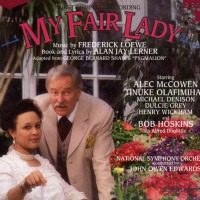 Studio Cast, 1993-94 (JAY, 2CDs)
Studio Cast, 1993-94 (JAY, 2CDs)  (3 / 5) Here is the first note-complete aural document of the My Fair Lady score. In this case, completeness is particularly important for the dance music, largely omitted on other recordings but included here. Other pluses: Alec McCowan is a delightful Higgins, and Tinuke Olafimihan is an excellent Eliza, fully credible in the Cockney numbers and singing “I Could Have Danced All Night” gloriously. As Freddy, Henry Wickham performs “On the Street Where You Live” with sincerity, although his voice is rather shaky. Michael Denison is serviceable as Pickering, even if he makes little attempt to match pitches in “You Did It.” But Bob Hoskins, a fine actor, simply doesn’t have enough voice for Alfred P. Doolittle’s songs; he sounds very raspy throughout, and his lower register is basically non-existent. The National Symphony Orchestra, recorded in state-of-the-art sound, plays beautifully in some sections but sloppily in others under John Owens Edwards; for example, there’s a flubbed entrance at the top of the overture that really should have prompted a retake. — M.P.
(3 / 5) Here is the first note-complete aural document of the My Fair Lady score. In this case, completeness is particularly important for the dance music, largely omitted on other recordings but included here. Other pluses: Alec McCowan is a delightful Higgins, and Tinuke Olafimihan is an excellent Eliza, fully credible in the Cockney numbers and singing “I Could Have Danced All Night” gloriously. As Freddy, Henry Wickham performs “On the Street Where You Live” with sincerity, although his voice is rather shaky. Michael Denison is serviceable as Pickering, even if he makes little attempt to match pitches in “You Did It.” But Bob Hoskins, a fine actor, simply doesn’t have enough voice for Alfred P. Doolittle’s songs; he sounds very raspy throughout, and his lower register is basically non-existent. The National Symphony Orchestra, recorded in state-of-the-art sound, plays beautifully in some sections but sloppily in others under John Owens Edwards; for example, there’s a flubbed entrance at the top of the overture that really should have prompted a retake. — M.P.
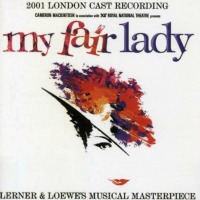 London Cast, 2001 (First Night) No stars; not recommended. As soon as you hear this cast album begin without the pulse-quickening music that began every previous production and recording of My Fair Lady, you’ll sense that you’re in for a deeply disappointing experience. Aside from fussy rearrangements/re-orchestrations by the normally reliable William David Brohn, the performance suffers from some very weak casting. As Eliza, Martine McCutcheon displays an exceedingly thin voice, and Mark Umbers’ rendition of Freddy’s “On the Street Where You Live” is full of superficial, heavy-handed effects but lacks real emotion. On the credit side, Jonathan Pryce offers an intelligent characterization of Henry Higgins, deftly walking the line between singing and speaking, and his imitation of Zoltan Karpathy’s Hungarian accent in “You Did It” is genuinely funny. As Pickering, Nicholas Le Prevost is also fine, and his byplay with Pryce is delightful. But it’s difficult to enjoy these worthy performances, given the setting. This recording is sadly indicative of the destructive influence that producer Cameron Mackintosh has had on musical theater, both in terms of his productions of poorly written new shows and his ill-conceived revivals of classics. — M.P.
London Cast, 2001 (First Night) No stars; not recommended. As soon as you hear this cast album begin without the pulse-quickening music that began every previous production and recording of My Fair Lady, you’ll sense that you’re in for a deeply disappointing experience. Aside from fussy rearrangements/re-orchestrations by the normally reliable William David Brohn, the performance suffers from some very weak casting. As Eliza, Martine McCutcheon displays an exceedingly thin voice, and Mark Umbers’ rendition of Freddy’s “On the Street Where You Live” is full of superficial, heavy-handed effects but lacks real emotion. On the credit side, Jonathan Pryce offers an intelligent characterization of Henry Higgins, deftly walking the line between singing and speaking, and his imitation of Zoltan Karpathy’s Hungarian accent in “You Did It” is genuinely funny. As Pickering, Nicholas Le Prevost is also fine, and his byplay with Pryce is delightful. But it’s difficult to enjoy these worthy performances, given the setting. This recording is sadly indicative of the destructive influence that producer Cameron Mackintosh has had on musical theater, both in terms of his productions of poorly written new shows and his ill-conceived revivals of classics. — M.P.
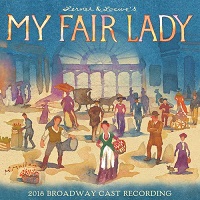 Broadway Cast, 2018 (Broadway Records)
Broadway Cast, 2018 (Broadway Records)  (4 / 5) Here’s the most satisfying — or, to put it another way, the least problematic — cast recording of My Fair Lady in many years. Lauren Ambrose made a largely well-received musical theater debut as Eliza in this Lincoln Center Theater production, her performance marred only by some odd physical mannerisms and a tendency to lag behind the beat throughout her songs. That first issue obviously doesn’t mar the album, and the second one seems to have been addressed during the recording sessions, so Ambrose’s performance here is quite enjoyable overall. Harry Hadden-Paton brings a refreshingly youthful energy to the role of Higgins; he sings the notes written in the score, rather than declaiming the lyrics, more often than any recorded Higgins before him, with the possible exceptions of Jeremy Irons and Alec McCowan. This is not necessarily the wisest decision, because some of the melody lines for Higgins’ songs are rather uninteresting, but it does help Hadden-Paton to make his performance his own. Norbert Leo Butz has a fine time with Alfie Doolittle’s numbers, Jordan Donica as Freddy Eynsford-Hill sings “On the Street Where You Live” beautifully, and Allan Corduner as Pickering is charming in what little he has to do on the recording. A 29-piece orchestra plays sumptuously under Ted Sperling, and happily, there has been no pointless futzing around with the brilliant, original overture, as Sperling had previously done with the overture of The King and I for the LCT production and recording of that classic. — M.P.
(4 / 5) Here’s the most satisfying — or, to put it another way, the least problematic — cast recording of My Fair Lady in many years. Lauren Ambrose made a largely well-received musical theater debut as Eliza in this Lincoln Center Theater production, her performance marred only by some odd physical mannerisms and a tendency to lag behind the beat throughout her songs. That first issue obviously doesn’t mar the album, and the second one seems to have been addressed during the recording sessions, so Ambrose’s performance here is quite enjoyable overall. Harry Hadden-Paton brings a refreshingly youthful energy to the role of Higgins; he sings the notes written in the score, rather than declaiming the lyrics, more often than any recorded Higgins before him, with the possible exceptions of Jeremy Irons and Alec McCowan. This is not necessarily the wisest decision, because some of the melody lines for Higgins’ songs are rather uninteresting, but it does help Hadden-Paton to make his performance his own. Norbert Leo Butz has a fine time with Alfie Doolittle’s numbers, Jordan Donica as Freddy Eynsford-Hill sings “On the Street Where You Live” beautifully, and Allan Corduner as Pickering is charming in what little he has to do on the recording. A 29-piece orchestra plays sumptuously under Ted Sperling, and happily, there has been no pointless futzing around with the brilliant, original overture, as Sperling had previously done with the overture of The King and I for the LCT production and recording of that classic. — M.P.
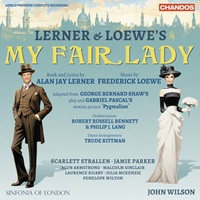 Studio Cast, 2025 (Chandos, 2CDs)
Studio Cast, 2025 (Chandos, 2CDs)  (4.5 / 5) This first-rate studio cast entry in the My Fair Lady discography begins with arguably the best performance of the show’s overture ever recorded; aided by superb audio engineering and state-of-the-art digital sound, conductor John Wilson leads the Sinfonia of London in a definitive presentation of these three minutes of musical theater heaven. Happily, such excellence exists throughout the entire album, which, like its predecessor on the JAY label, is a note-complete recording of the score. Here we also get large chunks of delicious dialogue as lead-ins to the songs and wherever the spoken word is closely interwoven with music. The pacing of the performance is exemplary and sometimes revelatory — for instance, the very slow and tentative beginning of “The Rain in Spain,” as Eliza is trying with all her might to pronounce that phrase properly, followed by a steady, exciting build of tempo as Higgins, Pickering, and Eliza herself are thrilled to realize that she has finally “got it.” In terms of casting, all is more than well: Jamie Parker is an energetic, youthful Higgins, petulant as appropriate yet refreshingly and effectively underplaying several of the character’s more emotional moments. Guided no doubt by Wilson, Parker makes consistently smart choices regarding how much of the role to declaim in sprechstimme and how much to actually sing. If Scarlett Strallen doesn’t deliver Lerner’s lyrics quite so pointedly as did Julie Andrews and some other previous Eliza Doolittles, she’s still a great pleasure to hear in the role due to her gorgeous soprano voice, and as is true of any successful Eliza, she sports convincing accents as both the Cockney flower girl and the grand lady of society. On the minus side, Malcolm Sinclair lacks the right sort of jolly-old-English comic style one wants in Pickering, but Laurence Kilsby as Freddy sings “On the Street Where You Live” ardently, and Alun Armstrong is a delight as Alfie Doolittle. Vivid cameos by Julia McKenzie as Mrs. Peace and Penelope Wilton as Mrs. Higgins are icing on this delectable cake. Bonus tracks include such interesting cut material as Higgins’ song “Come to the Ball,” an alternate version of “On the Street Where You Live” with an entirely different introductory section, and Eliza’s “Say a Prayer for Me Tonight,” which of course found its way into the score of Gigi. — M.P.
(4.5 / 5) This first-rate studio cast entry in the My Fair Lady discography begins with arguably the best performance of the show’s overture ever recorded; aided by superb audio engineering and state-of-the-art digital sound, conductor John Wilson leads the Sinfonia of London in a definitive presentation of these three minutes of musical theater heaven. Happily, such excellence exists throughout the entire album, which, like its predecessor on the JAY label, is a note-complete recording of the score. Here we also get large chunks of delicious dialogue as lead-ins to the songs and wherever the spoken word is closely interwoven with music. The pacing of the performance is exemplary and sometimes revelatory — for instance, the very slow and tentative beginning of “The Rain in Spain,” as Eliza is trying with all her might to pronounce that phrase properly, followed by a steady, exciting build of tempo as Higgins, Pickering, and Eliza herself are thrilled to realize that she has finally “got it.” In terms of casting, all is more than well: Jamie Parker is an energetic, youthful Higgins, petulant as appropriate yet refreshingly and effectively underplaying several of the character’s more emotional moments. Guided no doubt by Wilson, Parker makes consistently smart choices regarding how much of the role to declaim in sprechstimme and how much to actually sing. If Scarlett Strallen doesn’t deliver Lerner’s lyrics quite so pointedly as did Julie Andrews and some other previous Eliza Doolittles, she’s still a great pleasure to hear in the role due to her gorgeous soprano voice, and as is true of any successful Eliza, she sports convincing accents as both the Cockney flower girl and the grand lady of society. On the minus side, Malcolm Sinclair lacks the right sort of jolly-old-English comic style one wants in Pickering, but Laurence Kilsby as Freddy sings “On the Street Where You Live” ardently, and Alun Armstrong is a delight as Alfie Doolittle. Vivid cameos by Julia McKenzie as Mrs. Peace and Penelope Wilton as Mrs. Higgins are icing on this delectable cake. Bonus tracks include such interesting cut material as Higgins’ song “Come to the Ball,” an alternate version of “On the Street Where You Live” with an entirely different introductory section, and Eliza’s “Say a Prayer for Me Tonight,” which of course found its way into the score of Gigi. — M.P.

